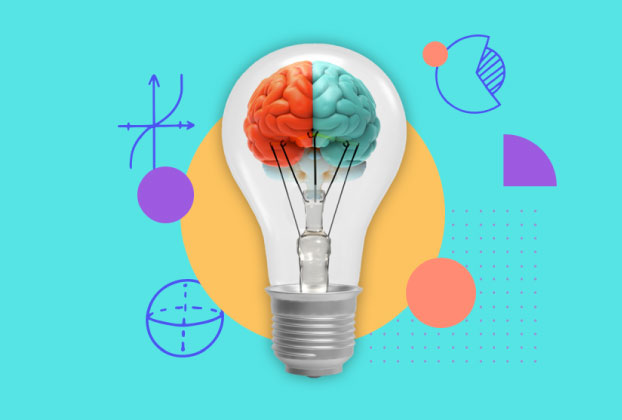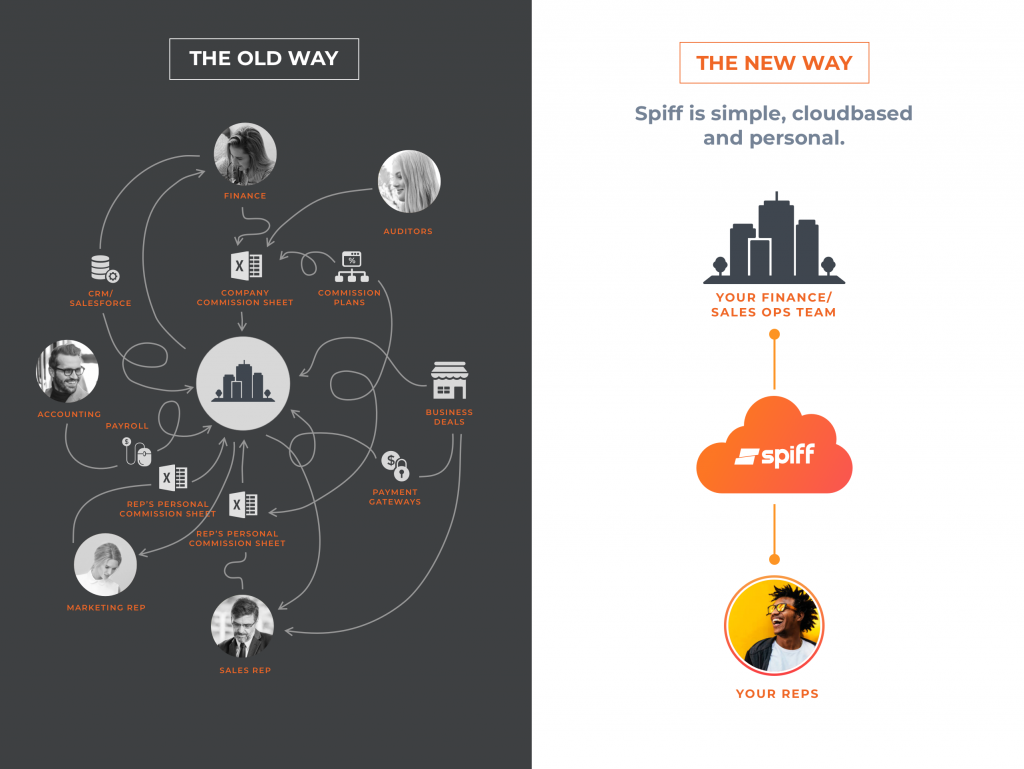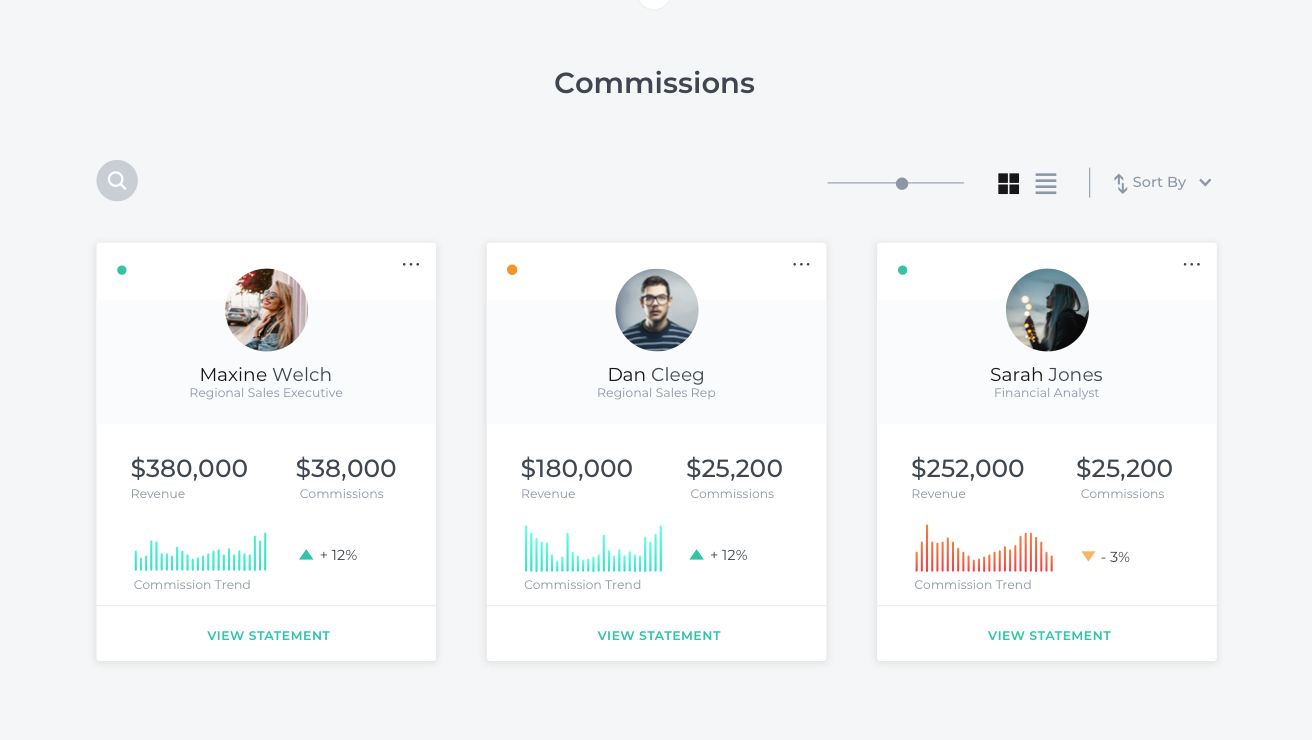I’m so excited to announce my next startup, Spiff! Spiff is an online platform for incentivizing your commissioned employees. We use data science and the latest tech to create commission plans that update in minutes, not months. We’ll provide you with tools to tap into the personal motivation drivers of each rep. It’s like a cheat code for finance/sales ops.
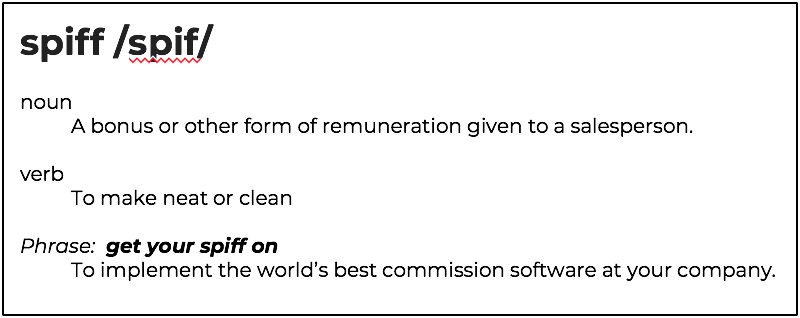
Most companies rely on commissions to motivate their sales force, but most companies do not have software on their side. Instead, finance rolls out a complicated commission spreadsheet every year and hopes for the best.
This approach has a few obvious problems. Commission spreadsheets:
- Are a nightmare to manage. The individuals managing these beasts don’t sleep. Spreadsheets just don’t scale. Forget about auditability, backups, scenario-testing, workflows, or connections with other systems.
- Don’t provide actionable data. They aren’t linked to current data so reps are out-of-sync with the data that’s supposed to motivate them.
- Are hard for reps to understand. Our research shows sales reps spend about 5 hours every month just trying to figure out how to understand their commissions, using a spreadsheet. Reps and the folks who built the spreadsheet just don’t speak the same language.
Even more…
New science has taught us a lot about motivation strategies, but that science is just sitting there. It’s like we discovered how to fly and yet we’re still taking ships to cross the Atlantic.
At Spiff we’re putting that science to use to create up-to-date, personalized motivation techniques that are designed to help all your employees succeed.
That’s right, we want to help you motivate everyone.
That’s because Spiff is on a mission to inspire, enable, and reward peak business performance. Why? Because business performance helps millions of people. It increases pay. It pushes people to learn and grow, innovate, and build.
Our first step is to relegate commission spreadsheets to the Dark Ages and replace them with a far better solution.
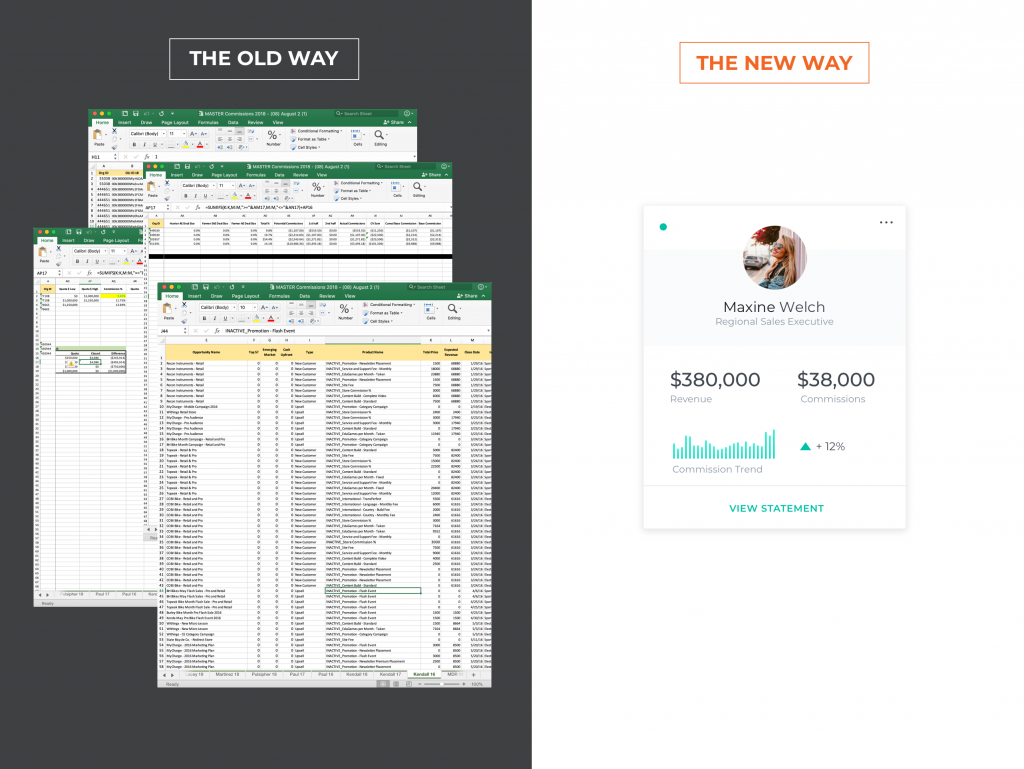
If that’s enough for you, request a demo right now.
If you need more convincing, read on.
Spiff Everyone, Baby!
I can’t help but notice a subtle shift in movies lately. Five years ago, cool characters were often Jobs or Zuckerberg-like entrepreneurs. Think about The Social Network. Now those same entrepreneurs are the villains (go see Venom). Software is eating the world and making far too few millionaires, billionaires, and trillionaires. In the US, CEOs make 354x what the average worker at their company does. Millennials don’t want to work for companies like this.
In the last company that I built, Capshare, I came to the conclusion that key elements of the startup dream are myths. For example, most startups nowadays offer equity to incentivize their employees. Most people believe that this equity will grant them riches and treasures beyond their wildest dreams if the startup succeeds.
But, looking at the big picture, we actually see that equity distribution in startups, even successful ones, is highly unequal.
With the wage gap doing the splits, it’s time that companies start to figure out better ways to share the wealth. This is where Spiff comes in.
With the right tools, there’s no reason you can’t roll out pay-for-performance plans to all of your employees. We’re doing that here at Spiff. EIS, right? “Everybody’s In Sales.” Now everybody can share in the company’s most important successes. We think Spiff incentive-based pay can become the startup equity of the future and every business can do it.
But there’s a lot more to our vision. To understand it, we’ll touch on the following topics:
- Motivation Science
- Money As a Motivator
- Non-Money Motivators
- Commission Systems 2.0
- How To Get Spiff At Your Company
Let’s start by talking about motivation.
Motivation Science
“If you want to build a ship, don’t herd people together to collect wood and don’t assign them tasks and work, but rather teach them to long for the endless immensity of the sea.” –Source Unknown
If I had to pick the best day of my career, it would be the day I deposited the first check at my first startup, Scalar. I literally smelled the check before handing it to the banker opening the account. To me, that very first check represented freedom.
Before Scalar, I worked in venture capital for 5 years. VC is a brutal business because you’re basically selling money. And in many ways, there’s nothing harder than trying to convince people that your dollar bills are somehow better than the dollar bills at every other VC firm.
But the clincher for me was that I didn’t feel like I could control my own destiny where I worked. I wasn’t a partner. To make more money, I worked hard and hoped the partners would increase my pay at my annual review. But the partners didn’t need another cook in the kitchen, so my upside was capped. I had no way to control how much money I made and no say in how far I expanded.
When I cashed that first check at Scalar, a powerful realization dawned. If I worked harder and smarter, I made more money. I had control over the way to earn money.
This realization is something sales reps have always known… Nothing feels better than bagging your own source of personal income.
While there are some people who are driven by money alone (which we’ll get to in a moment) many of us are driven by what money represents. Having more control over your own income often means that we also have more control over our lives. That’s why it’s such a good motivator.
Money As a Motivator
A series of recent experiments, published in the paper “Large Stakes and Big Mistakes”, have shown just how much of a motivator money is.
One of the experiments took two groups of students and gave each group a cash reward to hit two keys on a keyboard as many times as possible in 4 minutes. Those that hit the keys the fastest received a cash prize.
In one of the groups, the cash prize was $300, and in the other it was $30.
Can you take a guess at the result?
As you might expect, the first group performed better. 95% better to be exact. This led the researchers to conclude that money is a highly motivating force. Fairly obvious, right?
That’s what it seemed like… until they ran another experiment…
This time, the researchers had students solve a complex math problem.
Here’s the crazy part…
Those offered the higher reward performed 32% worse than the lower-paid group. This result seemingly violates a core law of behavioral economics!
It turns out if the task is difficult, the prospect of large sums of money can actually distract from a person’s work. This leads to a phenomenon aptly called “the distraction effect.”
The results of this confounding experiment kicked off plenty of head scratching among motivation experts. Eventually, they concluded that money can be a great motivator, but there is more to motivation than money.
Non-Money Motivators
Given that incentives are generally costly for those providing them, raising contingent incentives beyond a certain point may be a losing proposition. Perhaps there is good reason why so many workers continue to be paid on a straight salary basis.
—Large Stakes and Big Mistakes
Daniel Pink recently wrote a best-selling book about motivation science called Drive. He identified two types of people:
- Intrinsic Motivators. People who are motivated by internal factors like wanting to direct their own lives, learn, create, or to do better.
- Extrinsic Motivators. People who are motivated by external factors like money or prestige.
He even built a survey to identify these personality types.
Pink identified 3 primary intrinsic motivations:
- Autonomy. The ability to make your own decisions. Companies that foster autonomy explain goals to employees but let employees figure out how to achieve those goals.
- Mastery. The desire to achieve excellence at a discipline. Companies that foster mastery cultures encourage employees to constantly learn and improve (kaizen). They recognize absolute perfection isn’t possible but continuous improvement is.
- Purpose. The desire to feel like you are part of a larger purpose. Companies that foster purpose have a clear “Why?”.
In Pink’s research, we see a clear preference. He tends to highlight a lot of the negatives associated with extrinsic motivators, while putting a spotlight on the many positives of intrinsic motivators. However, both approaches remain important.
For example, money motivates best in situations where the problem isn’t too complicated, and it motivates best for certain personalities.
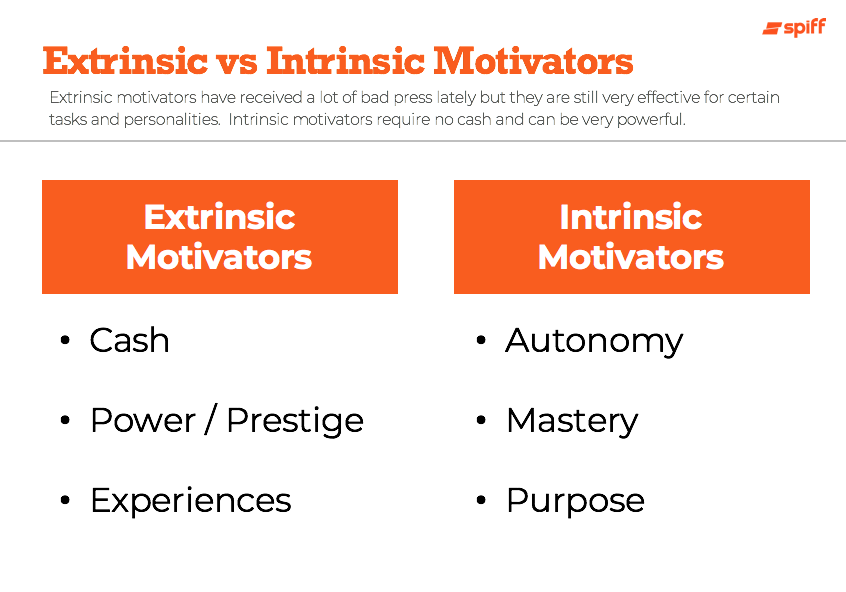 More importantly, the two motivation strategies tend to have a symbiotic relationship. After building and selling two companies, I have discovered that the relationship looks a bit like this:
More importantly, the two motivation strategies tend to have a symbiotic relationship. After building and selling two companies, I have discovered that the relationship looks a bit like this:
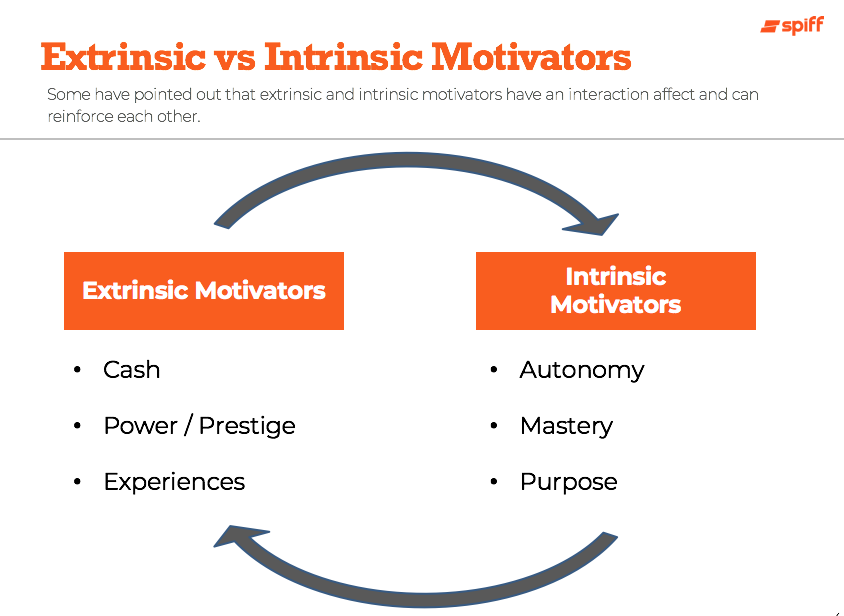 Intrinsic motivators can give rise to extrinsic motivators and vice-versa. For example, look at entrepreneurs. They tend to be slightly crazy people with big ideas and a sense for purpose. But they also go for big ticket ideas that they believe will reward them handsomely down the line.
Intrinsic motivators can give rise to extrinsic motivators and vice-versa. For example, look at entrepreneurs. They tend to be slightly crazy people with big ideas and a sense for purpose. But they also go for big ticket ideas that they believe will reward them handsomely down the line.
What is clear is that the vast majority of companies focus exclusively on only a few motivation strategies. In sales, it’s typically cash. There’s probably good reason for that as sales often attracts individuals who are money-motivated.
But companies aren’t using many more tools available to motivate and incentivize all of your teams–sales and non-sales.
This is where Spiff comes in. Leveraging a broader range of motivation techniques and science is a big part of Spiff’s vision.
But without more effective tools, these techniques are just academic. Which leads us to our next topic…
Commission Systems 2.0
Spiff wants to expand motivation techniques. We also think the world is long overdue for better tools for even the most simple motivation strategy: cash-based commissions.
We did deep-dive interviews with 100 of you and polled 10,000 others. What we found is that most of you are using spreadsheets to run your commission plans.
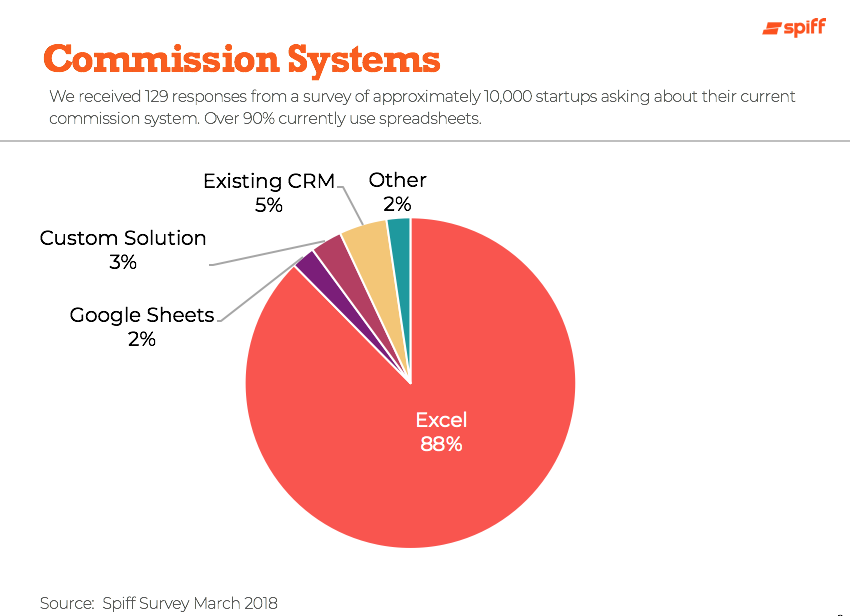
Maintaining these spreadsheets is, in the words of one interviewee, “like Victorian-style manual labor, minus the smog and adverse working conditions.”
Some of you finally got fed up and started using software. Problem is, the state-of-the-art commission systems haven’t improved for over a decade despite huge advances in technology. This is basically like moving your commission system from an Excel spreadsheet to Google Sheets. Yes, there have been some improvements but the underlying issues are still there.
While we can’t share our entire vision just yet, we can promise that we’ve addressed these persisting foundational problems. For now you’ll have to be satisfied with some tantalizing details 😋😋😋.
Spiff will push commission systems forward in these ways:
Speed
Imagine trying to teach a child to look for cars before crossing a street. But let’s say you consistently warn the child 1-hour after she makes a mistake. That kind of delayed conditioning won’t work well. Delayed rewards are equally ineffective.
That is why Spiff won’t quit until our clients can offer true “real-time” commissions. If your team is working hard, they should reap the benefits of that labor immediately.
Adaptability
Commissions drive behavior. Because of this, companies align commissions with their biggest strategies. But we all know company strategies change frequently based on changing markets. So commissions need to change too.
In fact, at Spiff we like to say: “The only constant of commissions is change.” To help keep pace with that constant change, Spiff will deliver a commission system that users can adapt in minutes, not months.
Elegance
“I would not give a fig for the simplicity this side of complexity, but I would give my life for the simplicity on the other side of complexity.” –Oliver Wendall Holmes
Commissions need to be complex enough to drive the right kinds of behavior. But they need to be simple enough to be effective. We call simplicity on the far side of complexity elegance. Our system will allow you to manage the enormous complexity of commissions in an elegant online platform.
Personalization
As we discussed above, reps respond differently to different motivation strategies. Spiff will help companies identify the commission plans most likely to work for their reps. Currently we are just focused on cash commissions. But over time, we’ll add a broader range of motivators.
Spiff also provides each rep with detailed knowledge of their plan so there is no confusion down the line. Our research shows that reps spend about 5 hours every month estimating commissions. Spiff makes that process simple and effective. Reps can always know where they stand with Spiff.
Celebration
Sales is hard.
I had the privilege of working under Marcos Lopez, the CEO of Solium, for the last year. During one town hall meeting for all employees, he mentioned that employees had been complaining about how much money salespeople made. He then invited anyone who so wanted to apply to sales.
As far as I know, nobody switched jobs. Probably because anybody who tries realizes it’s hard.
Spiff believes companies should celebrate hard work like sales better. Spiff has big plans to help you celebrate hard-fought wins with your commissioned reps.
Optimization

For a lot of companies, this (pointing up) is what commission optimization means. But you don’t want to be like that. You want to build systems that drive sales and rewards up.
For existing commission systems it’s basically impossible to optimize commission plans. Spiff is where commission meets science. Science requires testing. We built our system so that you can test commission plans on the fly.
Breadth
Most companies commission sales reps, customer support, account management, and executives. But we believe the future of compensation for all employees is performance-based, incentive pay. We believe it’s a social good to roll out commission plans to every employee.
Spiff won’t stop until our system is a great motivation tool for all employees.
How To Get Spiff at Your Company
Yeah, thanks to all the hustlers
And most importantly you: the customer
–Jay-Z, Roc Boys (And the winner is)
We’re all hustlers here at Spiff. But, like Jay-Z, we’ll never forget who keeps us in business: you, the customer.
If you take a chance on us, we promise you with our full reputations, we won’t let you down. Now, get your Spiff on and request a demo!
